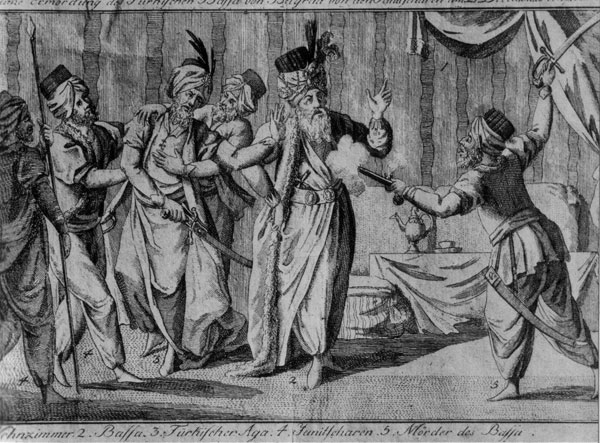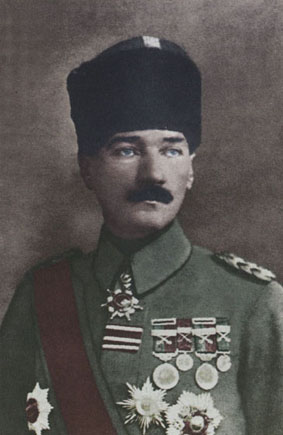|
Zulfikar Pasha Čengić
Zulfikar Pasha Čengić nicknamed Miljevina (died 1846) was an Ottoman Bosnian nobleman and a military leader. He is known for leading a penal expedition against the Montenegrin Drobnjaci tribe in 1812 and siding with the Sultan against the rebellious Bosnian ayans of Husein Gradaščević during the Bosnian uprising (1831–1832). Biography Zulfikar Pasha was born in Miljevina near Foča. His father was Salih Alay-Bey and his grandfather was Zejnil Bey. He had sons Džafer, Salih, Alija and Jusuf Bey. In 1811, Mustay Pasha of the Sanjak of Scutari organised an attack on Montenegro, directing his troops against the Piperi tribe. However, his campaign ended in defeat. The next year he ordered Zulfikar Pasha to attack the Montenegrin Drobnjaci tribe. One part of the Ottoman army was commanded by Smail Agha Čengić. Other Montenegrin tribes joined the Drobnjaci tribe. Although the Ottomans suffered heavy casualties, they managed to defeat the Montenegrins. The houses of the ... [...More Info...] [...Related Items...] OR: [Wikipedia] [Google] [Baidu] |
Pasha
Pasha, Pacha or Paşa ( ota, پاشا; tr, paşa; sq, Pashë; ar, باشا), in older works sometimes anglicized as bashaw, was a higher rank in the Ottoman Empire, Ottoman political and military system, typically granted to governors, generals, dignitary, dignitaries, and others. As an honorific, honorary title, ''Pasha'', in one of its various ranks, is similar to a British Peerage of the United Kingdom, peerage or knighthood, and was also one of the highest titles in the 20th-century Kingdom of Egypt. The title was also used in Morocco in the 20th century, where it denoted a regional official or governor of a district. Etymology The English word "pasha" comes from Turkish language, Turkish ('; also ()). The Oxford Dictionaries (website), Oxford Dictionaries attributes the origin of the English borrowing to the mid-17th century. The etymology of the Turkish word itself has been a matter of debate. Contrary to titles like emir (''amīr'') and bey (''beg''), which were es ... [...More Info...] [...Related Items...] OR: [Wikipedia] [Google] [Baidu] |
Ottoman Bosnia And Herzegovina
The Ottoman Empire era of rule in Bosnia and Herzegovina (first as a ''sanjak'', then as an ''eyalet'') and Herzegovina (also as a ''sanjak'', then ''eyalet'') lasted from 1463/1482 to 1878 ''de facto'', and until 1908 ''de jure''. Ottoman conquest The Ottoman conquest of Bosnia and Herzegovina started in 1384, and subsequently the Ottoman invasion expanded into the so-called Bosansko Krajište. The Kingdom of Bosnia finally fell in 1463. Herzegovina fell to the Turks in 1482. It took another century for the western parts of today's Bosnia to succumb to Ottoman attacks. Bosnia continued legally under the royal House of Berislavić, and fell finally in 1527 with the fall of its capital Jajce. The first occupation administration was established that same year. A significant number of Bosnians converted to Islam after the conquest by the Ottoman Empire in the second half of the 15th century, giving it a unique character within the Balkan region. This conversion appears t ... [...More Info...] [...Related Items...] OR: [Wikipedia] [Google] [Baidu] |
Muhafazah
A ' ( ; ) is a first-level administrative division of many Arab countries, and a second-level administrative division in Saudi Arabia. The term is usually translated to " governorate", and occasionally to "province". It comes from the Arabic root ' (verb: حفظ ḥafaẓa), which means to "keep" and "guard". The head of a ' is the () ' . Muhafazat in Arab countries *Governorates of Bahrain *Governorates of Egypt *Governorates of Iraq *Governorates of Jordan *Governorates of Kuwait *Governorates of Libya (historic) *Governorates of Lebanon *Governorates of Oman *Governorates of Palestine *Governorates of Saudi Arabia (2nd level) *Governorates of Syria *Governorates of Yemen Yemen is divided into twenty-one governorates (''muhafazah'') and one municipality ( amanah): Notes: a - Also known as Sanaa City b - Socatra Governorate was created in December 2013 from parts of Hadramaut, data included there The govern ... The governorates of Tunisia are '' wilāyah'' in Arab ... [...More Info...] [...Related Items...] OR: [Wikipedia] [Google] [Baidu] |
First Serbian Uprising
The First Serbian Uprising ( sr, Prvi srpski ustanak, italics=yes, sr-Cyrl, Први српски устанак; tr, Birinci Sırp Ayaklanması) was an uprising of Serbs in the Sanjak of Smederevo against the Ottoman Empire from 14 February 1804 to 7 October 1813. Initially a local revolt against Dahije, renegade janissaries who had seized power through a coup, it evolved into a revolution, war for independence (the Serbian Revolution) after more than three centuries of Ottoman rule and short-lasting Austrian occupations. The janissary commanders murdered the Ottoman Vizier in 1801 and occupied the sanjak, ruling it independently from the Ottoman Sultan. Tyranny ensued; the janissaries suspended the rights granted to Serbs by the Sultan earlier, increased taxes, and imposed forced labor, among other things. In 1804 the janissaries feared that the Sultan would use the Serbs against them, so they Slaughter of the Knezes, murdered many Serbian chiefs. Enraged, an assembly chose Ka ... [...More Info...] [...Related Items...] OR: [Wikipedia] [Google] [Baidu] |
Pasha
Pasha, Pacha or Paşa ( ota, پاشا; tr, paşa; sq, Pashë; ar, باشا), in older works sometimes anglicized as bashaw, was a higher rank in the Ottoman Empire, Ottoman political and military system, typically granted to governors, generals, dignitary, dignitaries, and others. As an honorific, honorary title, ''Pasha'', in one of its various ranks, is similar to a British Peerage of the United Kingdom, peerage or knighthood, and was also one of the highest titles in the 20th-century Kingdom of Egypt. The title was also used in Morocco in the 20th century, where it denoted a regional official or governor of a district. Etymology The English word "pasha" comes from Turkish language, Turkish ('; also ()). The Oxford Dictionaries (website), Oxford Dictionaries attributes the origin of the English borrowing to the mid-17th century. The etymology of the Turkish word itself has been a matter of debate. Contrary to titles like emir (''amīr'') and bey (''beg''), which were es ... [...More Info...] [...Related Items...] OR: [Wikipedia] [Google] [Baidu] |
Smail Agha Čengić
Smail-aga Čengić ( sr, Смаил-ага Ченгић;1780 – 23 September 1840) was an Ottoman Bosnian lord (with the title of ''aga'') and general in the Ottoman Army. In 1831–32, Čengić was one of the Ottoman generals that fought against Husein Gradaščević, who was leading a rebellion in Bosnia against the central Ottoman government. Čengić was killed by Novica Cerović as revenge for killing the younger brother of the Prince-Bishop of Montenegro, Petar II Petrović-Njegoš. His death inspired the 1846 epic poem ''The Death of Smail-aga Čengić'' by Ivan Mažuranić. Early life The Čengić family originates from Eğil, in present-day Turkey. Smail's father's name was Ibrahim. Smail was born in 1778 or 1780 in the village of Jelašce in the Sanjak of Bosnia, 35 km from Kalinovik (in modern-day Bosnia and Herzegovina). His father died when he was young. 1809–1813 As a junior officer and young general he fought against Serb insurgents between 1809 ... [...More Info...] [...Related Items...] OR: [Wikipedia] [Google] [Baidu] |
Piperi (tribe)
Piperi ( cyrl, Пипери) is a historical tribe (''pleme'') of Albanian origin and a region in northeastern Montenegro. Piperi is located between the Morača and Zeta rivers up to the northern suburbs of the Montenegrin capital Podgorica. Origins Originally an Albanian tribe ( sq, Pipri), the Piperi underwent a process of gradual cultural integration into the neighbouring Slavic population. A Franciscan report of the 17th century illustrates the final stages of their acculturation. Its author writes that the Bratonožići, Piperi, Bjelopavlići and Kuči:"'' nulla di meno essegno quasi tutti del rito serviano, e di lingua Illrica ponno piu presto dirsi Schiavoni, ch' Albanesi ''" (since almost all of them use the Serbian rite and the Illyric (Slavic) language, soon they should be called Slavs, rather than Albanians). Historical research has shown that Piperi is not a tribe (''pleme'') of common patrilineal ancestry. It formed in the period between the mid 15th century and the ... [...More Info...] [...Related Items...] OR: [Wikipedia] [Google] [Baidu] |
Prince-Bishopric Of Montenegro
The Prince-Bishopric of Montenegro ( sr, Митрополство Црногорско, Mitropolstvo Crnogorsko) was an ecclesiastical principality that existed from 1516 until 1852. The principality was located around modern-day Montenegro. It emerged from the Eparchy of Cetinje, later known as the Metropolitanate of Montenegro and the Littoral, whose bishops defied the Ottoman Empire overlordship and transformed the parish of Cetinje into a ''de facto'' theocracy, ruling it as Metropolitans ('' Vladike'', also known as '' prince-bishops''). The first prince-bishop was Vavila. The system was transformed into a hereditary one by Danilo Šćepčević, a bishop of Cetinje who united the several tribes of Montenegro into fighting the Ottoman Empire that had occupied all of Montenegro (as the Sanjak of Montenegro and Montenegro Vilayet) and most of southeastern Europe at the time. Danilo was the first in the House of Petrović-Njegoš to occupy the position as the ''Metropolitan o ... [...More Info...] [...Related Items...] OR: [Wikipedia] [Google] [Baidu] |
Sanjak Of Scutari
The Sanjak of Scutari or Sanjak of Shkodra ( sq, Sanxhaku i Shkodrës; sr, Скадарски санџак; tr, İskenderiye Sancağı or ''İşkodra Sancağı'') was one of the sanjaks of the Ottoman Empire. It was established after the Ottoman Empire acquired Shkodra after the siege of Shkodra in 1478–9. It was part of the Eyalet of Rumelia until 1867, when it became a part, together with the Sanjak of Skopje, of the newly established Scutari Vilayet. In 1912 and the beginning of 1913 it was occupied by members of the Balkan League during the First Balkan War. In 1914 the territory of Sanjak of Scutari became a part of the Principality of Albania, established on the basis of the peace contract signed during the London Conference in 1913. History Background and formation With short interruptions, the territory of northern Albania, including what would become the Sanjak of Scutari, belonged to the Serbian medieval states for many centuries. After the fall of the Ser ... [...More Info...] [...Related Items...] OR: [Wikipedia] [Google] [Baidu] |





